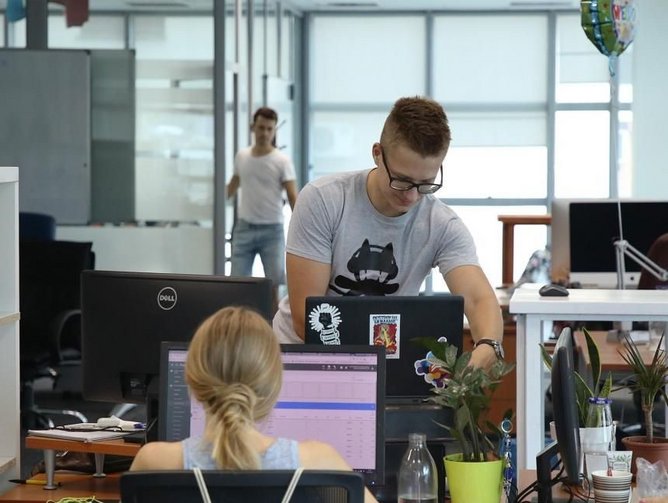Libertex: moving from monolithic systems to a service-oriented trading architecture
Founded in Russia, Libertex Group (formerly Forex Club), was originally established as an academy to teach people how to trade in Forex. The originators decided to create their own trading platform and take a lead in the market. Five years ago, amid growing instability and regulatory issues in the Russian market, international expansion began in Latin America. Three months later, activating a licence the company held with a Cyprus regulator, Libertex made the move into Europe. During the journey from single market operator to international trading platform provider Chief Information Officer Grant Brett has led the transformation at Libertex.
“Five years ago, it took us a quarter to achieve a delivery cycle, but now we’re delivering every day,” says Brett. “We’ve gone through big changes of our culture, technologies and work practices to realise that.” That change of culture began with the IT strategy Brett implemented as part of a three-year plan that focused on cloud first. “We looked at the five stages of our maturity… Level One being Ad hoc. Level Two, Repeatable. Level Three, Defined. Level Four, Measured, Level Five, Optimised,” explains Brett. “We discovered we were quite low in the scale, and that a company with 20-year-old legacy systems needed big transformational changes. We realised early on we needed to push a cloud-first, Big Data strategy allied to security and agile transformation. Of course, none of this would be possible without utilising our competitive advantage, the capable people in our organisation.”
The cloud-first strategy at Libertex targeted transforming from monolithic systems to service-oriented architecture. “We adopted AWS as our cloud partner and began focusing on technical mobility with a plug-and-play mentality rather than tight integration,” reveals Brett. “We had to forget about the legacy and dispose of technical debt; because when you're a commercially driven company things often need to be done quickly to meet commercial demand.” Operating with a hybrid approach to cloud, Brett’s team is tasked with implementing DevOps, SysOps and NetOps while preparing for BizOps.
“The game we’re in is the challenge of balancing commercial delivery with the architectural purity of our platform,” says Brett. “As we transition away from monolithic systems we have to make sure the benefits outweigh the cost. We’re seeing plenty of cases that prove we’re on the right track. For example, two years ago the industry was gripped by the latest round of cryptocurrency hype. We offer Crypto trading instruments, and in one month our traffic increased 320%. The Bitcoin price was going crazy and without having made some of those key transformations, we would have been dead in the water. There's no way that our environment could have scaled 320% overnight to cope with that month of activity. By moving key elements and utilising the elasticity of the cloud, we were able to scale up easily and back down after the hype was over.”
Helping drive transformation at Libertex, and making sure it’s ready for the next market hype, the company is partnered with Elastic who offer endpoint security and open source search and analytics solutions. Libertex also partners with Salesforce for flexible CRM services managing the sales organisation, sales targets and core customer interactions. “We've also used some interesting tools to help us in that journey towards real-time CRM,” adds Brett. “Mixpanel have also helped us with our customer communication tools.”
Meanwhile, the company’s own internal communications have been given a boost through its recent association with CommPeak. The leading VoIP provider was brought in to enhance connectivity and improve the efficiency of staff collaborations with a range of multi-channel engagement solutions (VoIP, SMS, DID, PBX, Dialer).
Brett also notes the importance of working with reseller IndigoSoft. A company with many years of experience on software development projects for financial clients, IndigoSoft develop IT systems for brokerage companies and investment funds. They also have expertise in connecting to different liquidity providers and electronic stock exchange gateways, including the integrated software of third-party trading platforms.
Rising to the challenges posed by the need to meet the demands of commercial delivery, Brett believes the solution is more than just technology… “It’s about people,” he says. “Changing people's thinking, let's say, from hosted to cloud environments, where they need to start considering the economics of what they’re delivering, how it's going to be deployed and used... That was a big issue for us. Introducing a message broker met with resistance. When you're used to dealing with monolithic systems, point-to-point integration is rare, but when you start moving into service-oriented architecture then you need to have a message box. But when people get it, the lights come on and everyone's on board. Thanks to our close relationship with AWS we're migrating everything to Kafka. The world's changing a lot, particularly with third-party integrations, now it's all about data streaming, so Kafka is helping us a lot.”
Brett notes that Libertex is unique among trading platforms as it's closely aligned to a much stronger control over risk while reacting to market trends for mobile products. “Margin trading is quite a risky product, but the stakes that you make when you go about opening a trade, the stake that you trade, is the limit of your risk,” he explains. “Because we're a mobile first company, we've had to spend a lot of time and effort to simplify the mobile space and make it a fast pathway for our customers to understand trading. We’re looking at creating a different window of opportunity for people to trade with us. If they're on their mobile, it's easy to do, they can make a trade and monitor it on the move. It's not like you imagine a trading desk with several monitors at a control station. Our market is to bring people into the world of trading because it's already quite competitive at the top end. We’re looking to expand the market from the bottom.”
The pace of change at Libertex in the past 12 months may have been swift but Brett is proud that his IT team has risen to the challenge and technology hasn’t been the bottleneck. The company’s development centre in Belgrade has taken on new staff (the IT department has swelled from 90 to 170). “We’re always evolving and finding new ways to work with product launches reaching the market,” says Brett. “We’re keeping pace with the key issues around Big Data, introducing agility and managing security while ensuring our platforms are scalable. We’re not aiming to be bleeding edge, but we’re in the game.”
That game is good to go globally with Libertex setting sights on addressing performance in South America and Asia. “We’re looking at ways we can break up our environment so that we can distribute it worldwide and address any performance issues,” confirms Brett. “Again, AWS has been very helpful to us in this space. There’s always a training or security issue to address, but the commercial side of the business has all the tools it needs to be successful. Looking ahead to 2020, now is the time for us to focus on developing an IT-excellence program, so that we're actually confident that data is good, performance is good, security is good, and we're eliminating what's left of the monolithic solution.”






